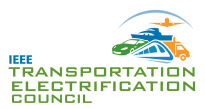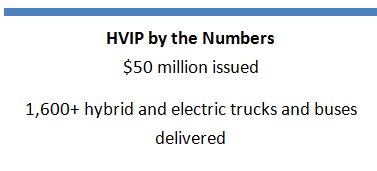California Program Speeds Deployment of Hybrid and Electric Buses
by David Kantor
Hybrid-electric and battery-electric buses have the proven ability to reduce criteria and greenhouse gas (pollutants). Nationwide, medium- and heavy-duty vehicles account for 18 percent of all global warming emissions from the transportation sector [1]. The high cost of technology related to the main components of hybrid and electrical vehicles is a significant obstacle preventing many fleets from implementing these technologies. Production volumes for these vehicles are still too low in the early market to realize price reductions, and the current payback period is long even with large fuel and maintenance savings. However, modest volume increases can help move prices to levels easily justifying purchase.
To accelerate the early market introduction of these vehicles, and to meet clean air and climate change goals, the State of California has developed an innovative voucher system. Now, in its third year, the California Hybrid and Zero-Emission Truck and Bus Voucher Incentive Project (HVIP) is designed to offset about half of the additional cost of eligible vehicles. Funding is available to both public and private fleets.
Unlike tax deductions or other tax incentives, which are often seen as cumbersome, HVIP is a simplified process. Approved voucher amounts are deducted right at the time of purchase, so there is no lengthy paperwork or wait times. This first-in-the-nation approach has become a model for effectively spurring clean vehicle technology implementation. Similar programs are currently being developed in the State of New York, and the City of Chicago.
To date, over $50 million has been issued through the program, and over 1,600 hybrid and electric trucks and buses have been delivered. At the time of writing, only $350,000 in funding was still available for the 2013 fiscal year and was expected to expire at any time, but an additional $5 million in funding is expected to be approved for 2014.
Vouchers range between $8,000 and $55,000 per bus, depending on the vehicle size, model, and the total number of vehicles purchased. Buses that are domiciled in the San Joaquin Valley are eligible for up to an additional $30,000 in plus-up voucher funding on top of the HVIP funds; allowing them to realize up to $85,000 in total funding per vehicle.
The Kings Canyon Unified School District is an example of one of the municipal fleets that have purchased buses with funding from the HVIP program. The district purchased five charge-sustaining hybrid electric International Coach school buses. John Clements, Director of Transportation for the Kings Canyon Unified School District said, “We continue to seek other grant award opportunities that improve our clean air goals and lessen our use of conventional petroleum fuels to reduce our cost of operations.”
Other leading fleets have purchased hybrid and electric trucks through the program, including Coca-Cola, Frito-Lay/Pepsico, and UPS, among others. Manufacturers with buses eligible for the program include Smith Electric, Proterra, and Thomas Built.
Funding for the program is provided by the State of California via Assembly Bill 118, the California Alternative and Renewable Fuel, Vehicle Technology, and Carbon Reduction Act of 2007, which was signed into law by Governor Arnold Schwarzenegger. HVIP is administered by CALSTART, a clean transportation technology and fuels consortium, under contract to the California Air Resources Board.
Additional information on the program, including lists of eligible vehicles and voucher requests can be found at www.californiahvip.org.
[1] California Hybrid and Zero-Emission Truck and Bus Voucher Incentive Project: Making the Case for Hybrid and Electric Trucks and Buses . Online at: http://californiahvip.org/making-the-case, accessed on June 5, 2013.
 David is CALSTART’s Deputy Project Manager for the California Hybrid and Zero-Emission Truck and Bus Voucher Incentive Project (HVIP). He also manages the HTUF Hybrid Refuse Truck Working Group and the EPA’s DERA Region II Aerodynamics project. In the past, David has authored reports on Bus Rapid Transit, co-organized multiple projects in hydraulic hybrid technology, managed a hydrogen infrastructure project, as well as a web site for alternative fuels. He has also supported projects in advanced energy storage and alternative transportation.
David is CALSTART’s Deputy Project Manager for the California Hybrid and Zero-Emission Truck and Bus Voucher Incentive Project (HVIP). He also manages the HTUF Hybrid Refuse Truck Working Group and the EPA’s DERA Region II Aerodynamics project. In the past, David has authored reports on Bus Rapid Transit, co-organized multiple projects in hydraulic hybrid technology, managed a hydrogen infrastructure project, as well as a web site for alternative fuels. He has also supported projects in advanced energy storage and alternative transportation.
David obtained a Bachelor of Arts in English Literature from Washington University in St. Louis, MO and a Master’s of Science in Urban Planning from Columbia University, where he studied environmental planning and analyzed brownfield redevelopment policy in the states of New York and New Jersey.
email: dkantor@calstart.org
About the Newsletter
Editors-in-Chief

Jin-Woo Ahn
Co-Editor-in-Chief

Sheldon Williamson
Co-Editor-in-Chief
TEC Call for Articles 2023 - Advances in Charging Systems
The TEC eNewsletter is now being indexed by Google Scholar and peer-reviewed articles are being submitted to IEEE Xplore.
To submit an article click here.



